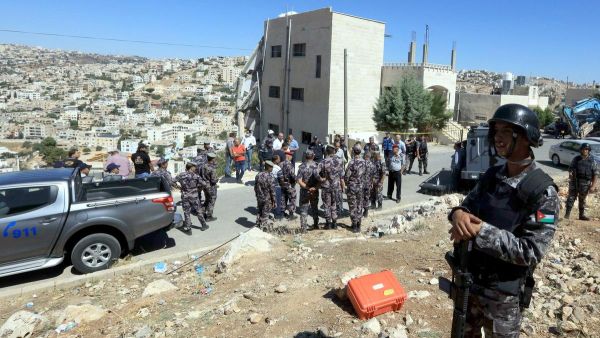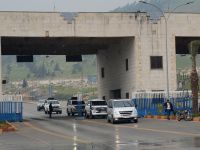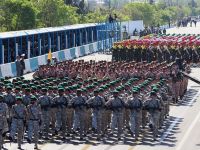By Eleanor Beevor
Jordan has maintained a rare stability in the Middle East, despite the political violence that has racked many of its neighbours. But this weekend an apparent terrorist attack on security forces, and the dramatic raid which followed, was a reminder that the Hashemite kingdom is still vulnerable to militant activity.
The incidents began on the night of Friday 10th August, when a patrol car was blown up while police were guarding a music festival in Al Fuheis, a small town about 20km outside of the capital Amman. One police officer, Sergeant Ali Adnan Qawqaza, was killed in the explosion. Six bystanders were wounded.
It appears that police traced the attackers to a house in the nearby town of As-Salt. The attackers are all believed to be Jordanians, although their affiliations to known terrorist groups have not yet been disclosed. On Saturday night, a dramatic stand-off ensued when police surrounded a multi-storey building in central As-Salt and called on the suspected terrorists to surrender.
The suspects occupying the building refused, and reportedly fired on security forces. They then proceeded to set off improvised explosive devices (IEDs) that they had earlier “booby-trapped” the building with, according to Government Spokeswoman Jumana Ghuneimat. This caused a part of the building to collapse. It is reported that at least 20 people were injured during the operation, including civilians. Four police officers were killed in the shootout.
The bodies of three suspected militants were pulled from the rubble of the collapsed building, and it is reported that automatic weapons were also recovered from the scene. Five suspects are now in custody. According to the Hala Akhbar news website, which is linked to the Jordanian military, the suspects intended to attack security installations and other targets in the country.
Experts say that the roots of Jordan’s security problem lie in both a prevalence of extremist ideology in the country, which is in turn empowered by the frustrations of everyday life for many Jordanians. Dr. Neven Bondojki, the Senior Researcher in Human Security at the Amman-based WANA Institute think-tank, told Al Bawaba:
“It is well established by now that Jordan includes incubating environments for radical ideology. The numbers of Jordanian among Daesh and Al Nusra’s leaders is one telling example. Added to that, the main ideologues for Islamic violent extremism are Jordanians. Generally speaking, the security forces succeeded in negotiating with main leaders of this trend, like Al Maqdisi and Abu Qatada, who argued against executing attacks in Jordan or against the state. But as we have seen between Nusra and Daesh, there are conflicts among extremists.
The attacks in Fuheis and Salt point to the existing cells in Jordan who disagree with Maqdisi and who take it upon themselves to attack the Jordanian state. One can also expect a power conflict among these groups who seek to assert their power on the ground through these attacks.”
Whilst Jordan has not been as badly affected by terrorist attacks as many of its neighbours, its citizens have not escaped the suffering either. In June 2016, an ISIS sympathiser shot dead five Jordanian intelligence officers who were visiting a refugee camp. In December 2016, ten people were killed in a shooting at Karak Castle, including a Canadian tourist, an attack for which ISIS later claimed responsibility.
Jordan is second, behind Tunisia, in terms of countries with the highest numbers of citizens travelling to join ISIS in Syria and Iraq. Over 4000 Jordanians have travelled to join the terrorist group since 2011. High profile stories of ISIS radicalisation networks in country has many fearful that Jordan may have extensive networks of ISIS supporters.

US ally Jordan has played a key role in the US-led coalition fighting the Islamic State group and has been hit by a string of jihadist attacks in 2016 (AFP)
Jordan has upped its efforts against terrorism with the help of international partners. A Counterterrorism Training Centre, funded by the US Government, was opened in March 2018 in South Amman to further Jordanian involvement in regional anti-terrorism operations. After this weekend’s attack, Jordanian Prime Minister Omar Razzaz stated that Jordan will continue to be “a sharp sword in the face of terrorism”.
However, “hard” solutions to terrorism will not be enough on their own. Extremist ideology is far more powerful when the populations that recruiters target are frustrated. Jordanians have been grappling with economic downturn for some years.
Moreover, many ordinary people find themselves excluded from opportunities to better their lives because of engrained systems of patronage, and a need for social connections to receive better jobs. Left unchecked, says Dr. Bondojki, this can fuel resentment towards the authorities. She continued:
“All attackers are Jordanians; and this is not the first time Jordanians have attacked fellow Jordanians in the country. This points to the failure in developing a sense of national identity and belonging that offers all Jordanians a sense of pride in this belonging and a desire to protect the country and its citizens from destruction. Educational institutions, as well as the trust deficit in the government, nepotism, and unequal implementation of the law all fracture that sense of pride and belonging to the national state.
In such circumstances, the government and the state become the enemy of citizens who are unable to feel respected by the government. This anger towards the state is translated towards symbols of the state, and in this case the police.”
Jordan’s security forces certainly have a significant challenge ahead of them. As this week’s incidents prove, security threats are still widespread, and attackers’ greatest strength is surprise. Jordanian security forces have an impressive track record of foiling terrorist attacks on their soil, and will likely be able to count on international support to deal with immediate terrorist threats. But steering its citizens away from terrorism by addressing deep-seated social grievances will be a much bigger challenge.







